
|
![]()
Greatest Films of the 1940s
1940 | 1941 | 1942 | 1943 | 1944 | 1945 | 1946 | 1947 | 1948 | 1949
Title Screen Film Genre(s), Title, Year, (Country), Length, Director, Description 

Bambi (1942), 70 minutes, D: Disney Studio
Another appealing, popular Disney animated film classic, based on Felix Salten's book. The legendary film followed newborn baby fawn Bambi as he grew up, experienced the loss of his mother by a hunter, and eventually became a leader of the herd - a magnificent stag. The maturing of Bambi illustrated the struggles, turmoil, and changes that accompanied the changing of seasons, the passage of time, and life's survival, as he came of age and completed the cycle of life. With memorable supporting characters and forest friends of Bambi, including Thumper the rabbit, Flower the skunk and Owl. Memorable scenes included the killing of Bambi's mother, and the raging forest fire.





Casablanca (1942), 104 minutes, D: Michael Curtiz
The best-loved film of all time, a perennial-favorite, a must-see classic and Best Picture. [Note: The date given for the film is often either 1942 and 1943. That was because its limited premiere was in 1942, but the film did not play nationally, or in Los Angeles, until 1943.] A tale of intrigue, romance, love lost, heroism, and conscience, with a well-paced dialogue, sentimental script, moody and atmospheric sets, and a first-rate cast of memorable characters. Set during World War II in Casablanca (North Africa) at a seedy Algerian saloon/nightclub run by cynical saloonkeeper Richard "Rick" Blaine (Humphrey Bogart), an American expatriate. The Cafe Americain was filled with European refugees, smugglers, thieves and Nazis. Into his joint walked now-married, long-lost-love Ilsa Lund Laszlo (Ingrid Bergman) and her underground Resistance freedom-fighter husband Victor Laszlo (Paul Henreid), who were trying to arrange their escape from the Nazis. They urged him to help support the French Resistance movement. Vivid memories of Rick's and the luminous Ilsa's passionate Paris love affair (just before the Germans occupied the city) ending in betrayal were shown in flashback. Ilsa asked Rick to help them escape to neutral Lisbon, because he had two "letters of transit" - would he give the letters to them, or would she stay with Rick?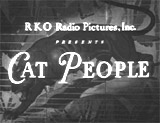

Cat People (1942), 73 minutes, D: Jacques Tourneur
A classic, suspenseful RKO horror film, the first produced by horror film master Val Lewton (and his biggest hit), with moody and sinister atmosphere, eerie sound effects, subtle understatement, interesting camera angles, and judicious use of shock effects. An ship-building architect Oliver Reed (Kent Smith) married a mysterious but beautiful young fashion designer Irena Dubrovna (Simone Simon). He worried when his obsessed wife refused to consummate the marriage. She believed she had inherited her Balkan family's ancient and evil curse from the homeland - part of a legend that if she became sexually and passionately aroused, she might be transformed into a killer panther and hunt and kill her lover. Psychiatrist Dr. Judd (Tom Conway) foolishly thought he could cure her.



Gentleman Jim (1942), 104 minutes, D: Raoul Walsh
An entertaining, highly-fictionalized sports biography of famous heavyweight boxer "Gentleman Jim" James J. Corbett (Errol Flynn). It followed his career from a poor, brawling Irish family, to a lowly job as a bank clerk, then an amateur boxer, and onto the professional level in the 1890s ("the Naughty Nineties") - in the early days of bare-knuckled boxing. Based loosely upon James J. Corbett's own autobiography The Roar of the Crowd. The film was set in turn-of-the-century San Francisco. He was known for using "scientific" boxing techniques - the first to "dance" around the ring with elusive footwork. He also found time to romance SF socialite love interest Victoria Ware (Alexis Smith), an ambivalent patrician belle who believed he had a "swelled" head, although she supported him. Boxing was being transformed from a lower-class, illegal sport with new Marquis of Queensberry rules - three minute rounds, one minute between rounds, a ten-count, and no hitting below the belt. The brash, extroverted, stylish and charming Gentleman Jim cheerfully challenged John L. Sullivan (Ward Bond) to an 1892 championship match, revealed in an exciting, action-packed sequence of 21 rounds.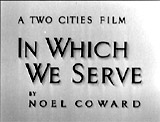



In Which We Serve (1942, UK), 115 minutes, D: Noel Coward, David Lean
The first film with a directorial credit by David Lean. A stirring, patriotic (propagandistic), British World War II drama, the story of the lives of the crew of a torpedoed British destroyer HMS Torrin, commanded by Captain E. V. Kinross R.N. (director Noel Coward) (aka Captain 'D'), sunk in the Battle of Crete in 1941 in the Mediterranean. Based on the real-life experiences of Lord Louis Mountbatten, Captain of the Royal Navy destroyer named HMS Kelly, which was sunk by enemy action early in the war in May, 1941. Filmed like a black and white documentary, with narration (by Leslie Howard) recounting the historic efforts of the three surviving crew members on a life raft, while they flashed back to memories of their loved ones and service to the ship. The three were: (1) ordinary seaman Shorty Blake (John Mills), whose girlfriend was Freda Lewis (Kay Walsh), (2) Chief Petty Officer Walter Hardy (Bernard Miles) who was married to ill-fated pregnant Katherine Lemmon Hardy (Joyce Carey), and (3) Capt. Edward Kinross, with two children and wife Alix (Celia Johnson). With two stirring speech sequences: an after-dinner speech by Alix, and Kinross' own concluding speech. The film closed with the narrator's words: "God bless our ships and all who sail on them."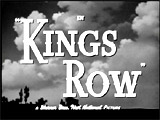

Kings Row (1942), 127 minutes, D: Sam Wood
A penetrating look at American morals (rivalries, jealousies, and sordid affairs) in a seemingly peaceful small rural Midwestern (Missouri) town, Kings Row, at the turn of the century. With a fantastic score by composer Erich Wolfgang Korngold (although unnominated for an Academy Award!). Two young men, future medical student Parris Mitchell (Robert Cummings) and wastrel playboy Drake McHugh (Ronald Reagan, in his career's best and most memorable role) grew up there. Other characters included the town's psychiatrist Dr. Alexander Tower (Claude Rains) and his unbalanced daughter Cassandra Tower (Betty Field), Drake's working class girlfriend Randy Monoghan (Ann Sheridan), and the troubled and sheltered Louise Gordon (Nancy Coleman), daughter of vengeful and moralistic surgeon Dr. Henry Gordon (Charles Coburn). When they reached adulthood, a series of tragic incidents revealed sadism, insanity, moral decay, deceitfulness, and pettiness deceptively hidden in the town. At one point, Drake's dating relationship with Louise was curtailed due to her uptight parents' feelings about him. And then home-schooled, restricted Cassie was poisoned by her father (who wished to protect Parris from his insane daughter), who then suicidally shot himself (as an act of coverup or regret). Drake, who married girlfriend Randy, was unexpectedly the victim of a brutal Dr. Gordon - both of his legs were amputated following a railroad yard accident, prompting him to ask in the famous line: "Where's the rest of me?" [Note: Future 40th President Ronald Reagan titled his 1965 autobiography with this line.] The film ended with Parris becoming the town's doctor after the death of Dr. Gordon, his truthful support of Drake in a triumphant conclusion, and his romancing of 19 year-old Elise Sandor (Kaaren Verne) who lived with her father in his former residence.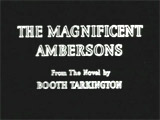

The Magnificent Ambersons (1942), 88 minutes, D: Orson Welles
An adaptation of Booth Tarkington's Pulitzer Prize-winning novel, a rich and dramatic period production, although Welles claimed it was "ruined" by the studio's intervention, editing, and censorship. The studio reshot some of the footage, re-edited the film down from the original length - 148 minutes - to 88 minutes, misunderstanding it and mutilating it with cuts, and adding a happy ending. This was Orson Welles' first film following his cinematic success with Citizen Kane a year earlier. Welles both wrote the screenplay and directed this film, a favorite of the critics, and a score composed by Bernard Herrmann. With rich innovative cinematographic and audio techniques (by Stanley Cortez), including contrasting light and dark shadows, deep-focus photography, moving dolly and truck camera shots, iris-in iris-out scene closings, and "Welles sound" montages. It was the 25-year story of the decline of a wealthy midwestern Victorian family, the Ambersons, beginning in the 1890s and continuing into the 20th century. Young Eugene Morgan (Joseph Cotten) loved Isabel Amberson (Dolores Costello), but she married Wilbur Minafer (Donald Dillaway). About twenty years later, Eugene returned to the town as a successful automobile inventor/manufacturer and began to court the widowed Isabel. But her spoiled and arrogant Oedipal youngest son George Amberson (Tim Holt), broke up their relationship. The Amberson family fortune disappeared, as Eugene's automobile industry fluorished.

The Man Who Came to Dinner (1942), 112 minutes, D: William Keighley
A wacky, side-splitting classic screwball comedy, originally a smash Broadway hit play by George S. Kaufman and Moss Hart, although stagey and dated on screen. A bombastic, cocky, and witty radio celebrity Sheridan Whiteside (Monty Woolley) on a lecture tour fell and broke his leg on slippery ice while in Mesalia, Ohio. The egotistical and abrasive Sheridan was forced to remain during the winter at the house of a local midwestern family, conservative businessman Ernest (Grant Mitchell) and his dotty matronly wife Daisy Stanley (Billie Burke) while he recuperated from his injury, aided by nurse Miss Preen (Mary Wickes). His hosts were driven crazy and relegated to the second floor, and the household was thrown into chaos by his unending eccentric demands, expensive long-distance phone calls, orders to the servants, his loud-mouthed obnoxious manner, exotic animals (an octopus and penguins), and an assortment of oddball friends that came to visit him. His trusted secretary Maggie Cutler (Bette Davis) fell in love with local newspaper man Bert Jefferson (Richard Travis), complicating everything when the conniving Sheridan hired gold-digging, narcissistic actress friend Lorraine Sheldon (Ann Sheridan) to seductively steal Maggie's love interest so that she wouldn't marry and then quit as his secretary. And when Sheridan discovered that his leg was actually fine, he bribed Dr. Bradley (George Barbier) to prolong his stay, and used blackmail (the threat to reveal that the Stanley's nutty sister Harriet (Ruth Vivian) was once put away for being an axe murderer) to remain ensconced.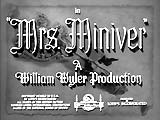


Mrs. Miniver (1942), 134 minutes, D: William Wyler
A moving, morale-boosting, propagandistic war drama (Best Picture winner) and box-office hit from MGM, adapted from the novel by Jan Struther. It followed the lives of beleaguered but courageous British villagers who faced tremendous trials, hardships, and dangers during World War II and the Nazi aggression. In the town of Belham outside of London in the Thames Valley, the middle-class Miniver family, headed by Clem (Walter Pidgeon) and Kay Miniver (Oscar-winning Greer Garson), faced the onset of the war, including war-time rationings, bombings during the London Blitz, a downed, wounded and threatening German paratrooper, the trauma of their sons fighting in the effort - one of whom was their eldest Oxford-educated son Vin (Richard Ney) who entered the Royal Air Force, and terrifying air raids - one of which killed daughter-in-law Carol Beldon (Teresa Wright), Vin's wife. In the finale, the courageous family sang: "Onward Christian Soldiers" in a bombed-out village church as proof that there would always be an England, and the church's vicar (Henry Wilcoxon) read from Psalm 91 and delivered a moving, patriotic speech. Included dramatic footage of the Dunkirk evacuation (in which Clem participated).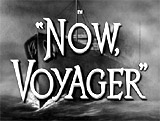

Now, Voyager (1942), 117 minutes, D: Irving Rapper
A sentimental, superb, romantic soap opera and tearjerker with great performances and a lush Max Steiner score, with a title based on Walt Whitman's 1900 work Leaves of Grass and the poem "The Untold Want": "Now, Voyager, sail thou forth to seek and find." A shy, disturbed, dowdy and lonely middle-aged spinster, Charlotte Vale (Bette Davis) from a prominent Boston family was dominated and tormented by her mean, unloving mother Mrs. Henry Windle Vale (Gladys Cooper). Sheltered ugly duckling Charlotte was helped by kindly psychiatrist Dr. Jaquith (Claude Rains) at his clinic to assist her in blossoming into a swan - a lovely, confident young woman was brought out of her shell. She took an ocean cruise to discover herself and met handsome, but unhappily married Jerry Durrance (Paul Henreid). They had an affair and entered into an ill-fated romance - because he could never leave his wife. Returning to Boston, she resisted falling under her mother's domination and was liberated from maternal control. Her mother suffered a stroke when Charlotte broke off her engagement to eminent Bostonian Elliot Livingston (John Loder) after meeting Jerry again. Charlotte returned to Jaquith's clinic to resolve feelings of guilt and there identified with and helped Jerry's shy, withdrawn daughter Tina (Janis Wilson), who had been rejected by her mother too. By coming close to Tina as a surrogate mother, she brought Jerry back into her life. Included the famous, memorable scene of Durrance lighting two cigarettes at once.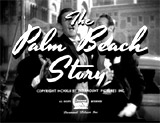

The Palm Beach Story (1942), 88 minutes, D: Preston Sturges
One of the best of Preston Sturges' fast-paced, zany and madcap screwball comedies with snappy dialogue, originally titled: 'Is Marriage Necessary?' It opened with the end of the five-year marriage of struggling, poor, stingy architectural engineer/inventor Tom (Joel McCrea) and his frustrated, slightly wacky, but ambitious wife Gerry Jeffers (Claudette Colbert). As she was preparing to leave, the couple met the half-deaf Texas "Wienie King" (Robert Dudley) who was apartment-hunting and offered the destitute couple $700 (for back rent, a new dress and salon visit, and dinner). Shortly after, Gerry departed and boarded a train bound for posh Palm Beach, Florida, to get a divorce. Her scheme was to help finance her husband's inventions (and plans for a $99,000 airport) by locating a rich bank-rolling financier. On the train, she encountered a wealthy but wacky, oddball heiress divorced five times named Princess Centimillia (Mary Astor), her companion Toto (Sig Arno) and her eccentric, clumsy millionaire brother John D. Hackensacker III (Rudy Vallee), and a group of tipsy millionaire hunters in the Ale and Quail Club, led by First Member (William Demarest). J.D. fell madly in love with Gerry and pursued her with wealth and riches. Things got more complicated, hilarious and interesting when Gerry's husband arrived in Florida (financed by the "Wienie King") to jealously win her back (by pretending to be Gerry's brother Captain McGlew), even while the Princess fell in love with him.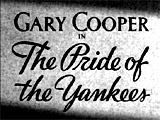


The Pride of the Yankees (1942), 127 minutes, D: Sam Wood
An exceptional sports biography of one of the greatest baseball players ever, Yankee first baseman Lou Gehrig (Gary Cooper), following his life from his playground days to New York Yankee stardom in the 1920s and 30s. At the height of his career, he was afflicted by a crippling, lethal and incurable muscle disease - ALS or amyotrophic lateral sclerosis (now bearing his name "Lou Gehrig's Disease") and eventually died. The film chronicled the struggles of his immigrant parents, his early life, his romantic courtship and marriage to Eleanor (Teresa Wright), his career and his courageous fight against the disease. It was a sensitive portrayal, endearing and touchingly portrayed, especially the final emotional scene - his memorable farewell address at Yankee Stadium: "...People all say that I've had a bad break. But today - today I consider myself the luckiest man on the face of the earth."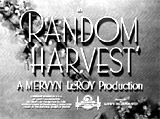



Random Harvest (1942), 125 minutes, D: Mervyn LeRoy
MGM's sentimental, moving melodramatic romance with an implausible plot (based on the James Hilton novel) - was about an amnesia victim who forgot the woman he loved and married. A shell-shocked and mute World War I army officer (Ronald Colman) suffered from amnesia and was renamed John Smith (or "Smithy"), at the Melbridge County Asylum. He walked away from the facility during the Armistice celebration in 1918, and in the town of Melbridge, he met and fell in love with music dance hall singer/performer stage-named Paula Ridgeway (Greer Garson). They were happily married, moved into a rented cottage in Devon, and had a son together during a three year period. While away in Liverpool to apply for a job at the Mercury newspaper, a sudden shock to his head from a car accident caused him to regain his former memory/life from three years earlier as Charles Rainier (also Ronald Colman) and forget Paula and their life together. Years later, Paula tracked him down, and found him at work in his family's industrial factory. She reentered his life as Margaret Hansen, but on the advice of the doctor, did not reveal her identity or their past life together (or that their son had died). She became his devoted secretary as she persistently but patiently attempted to rekindle their relationship which he couldn't remember. Rainier's new fiancee, Kitty (Susan Peters) called off their engagement, leaving him depressed, so he turned to Paula and asked her for marriage "in friendship" - or a "merger" in name only. In the final memorable scene, he was jarred into remembering his past life with her when he was fully reunited with her in the familiar setting of their cottage in Devon.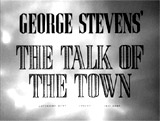


The Talk of the Town (1942), 118 minutes, D: George Stevens
An intelligent screwball comedy concerning a love triangle between a woman, a suspected murderer and a celebrated defense attorney. An avowed anarchist, factory worker Leopold Dilg (Cary Grant) was a fugitive from justice, falsely wanted and framed by his employer for murder/manslaughter and the arson of the factory. He escaped into the countryside and sought refuge in the attic of a rented summer house, being prepared by sympathetic school teacher Nora Shelley (Jean Arthur) for an unsuspecting vacationing law professor Michael Lightcap (Ronald Colman). Dilg posed as the gardener while he attempted to prove his innocence. The stuffy renter, a strict law-and-order man, and a Supreme Court judge appointee, took a liking to the fugitive as they engaged in a series of witty debates and discussed the justice system. The judge defended Dilg from an angry lynch mob in the final trial, clearing him of the charges. The final scene revealed whom Nora romantically chose (one of the film's two possible endings).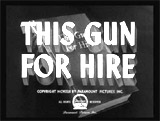


This Gun for Hire (1942), 80 minutes, D: Frank Tuttle
An atmospheric, sinister, film noir mystery from Paramount Studios, an adaptation from Graham Greene's novel A Gun for Sale. Remade as director James Cagney's Short Cut to Hell (1957). This was the first of four pictures teaming Alan Ladd with co-star Veronica Lake and their great on-screen chemistry, followed by two great noirs: The Glass Key (1942) and The Blue Dahlia (1946), and Saigon (1948). Paid professional killer Philip Raven (Alan Ladd), after committing two murders for hire, sought revenge after being double-crossed by double-agent Willard Gates (Laird Cregar) and chemical company president Alvin Brewster (Tully Marshall). Drawn into the hunt after meeting by accident (and sharing a common enemy, Gates) was super-sultry, peek-a-boo blonde nightclub singer/magician Ellen Graham (Veronica Lake), who attempted to understand the "soft side" of the murderous, cold-blooded hired gun, who admitted he was abused as a child. The pair struggled to avoid police, led by Ellen's boyfriend - police investigator Michael Crane (Robert Preston), as Raven tracked his double-crossing smugglers down to a secret plant where the spy ring manufactured poison gas to sell to Japan - the wartime enemy. In the rousing conclusion, Brewster attempted to kill Raven but died of heart failure, while Raven shot Gates dead. Raven was lethally-wounded by police, but did not shoot Michael because Ellen was helping him. As Raven died, they found the sabotagers' written confession.

To Be or Not to Be (1942), 99 minutes, D: Ernst Lubitsch
A classic, black comedy satire, propagandizing and exposing the real nature of the Nazis by lampooning the Third Reich and its leader. It was a controversial film that used humor to deliver a powerful message against tyranny. Remade as a comedy To Be or Not to Be (1983), by director Mel Brooks. The two leads were hilarious Joseph Tura (Jack Benny) and his flirtatious wife Maria (Carole Lombard in her final screen appearance, before her tragic death in a plane crash) - the stars of a shabby Polish Shakespearean theatrical group. They satirized and outwitted the Nazis during World War II in Nazi-occupied Warsaw. The troupe's anti-Nazi play Gestapo was censored and the actors were only allowed to perform a production of Shakespeare's Hamlet. Hammy and vain Joseph gave priceless imitations of Hamlet and other Nazis (in disguise) to fool the inquisitive Nazis, led by bumbling Col. Ehrhardt (Sig Ruman), aka "Concentration Camp" Ehrhardt. They helped fugitive Polish flyer Lt. Stanislav Sobinski (Robert Stack), who was madly in love with Maria, to prevent an imposter-spy sent from England named Professor Alexander Siletsky (Stanley Ridges) from delivering names of the underground resistance to the Gestapo.



Woman of the Year (1942), 112 minutes, D: George Stevens
A witty romantic comedy-drama (and a semi-screwball comedy) about gender roles originally developed by Garson Kanin (with an Oscar-winning script by Ring Lardner, Jr. and Michael Kanin). This marked the first onscreen pairing of Tracy and Hepburn (the first of nine such films that lasted over a period of 25 years). It was a charming film with superb acting, dialogue and chemistry between the two actors. Successful New York newspaper sportswriter Sam Craig (Spencer Tracy) worked for the same newspaper as celebrated, sophisticated, no-nonsense, career-minded political columnist Tess Harding (Katharine Hepburn). She claimed to know everything but sports and domesticity, so he decided to teach her about the simple pleasures of life. They first met after he angrily responded in a column to her unpopular opinion that baseball games should be suspended during the war. The opposites (or odd-couples) had some attraction to each other and got married, but found that they had very little in common with each other. She was clueless when he took her to a daytime baseball game - a classic scene. The plot highlighted their strained marital relationship: her inabilities as a housewife although she was a devoted career-woman feminist, while he drank, had typical male expectations and resented her working career. In the film's conclusion, she considered getting divorced, but then was chosen "Woman of The Year." The film included the famous final scene of Tess attempting to cook breakfast (coffee, waffles, and eggs) in his kitchen, with disastrous results.


Yankee Doodle Dandy (1942), 126 minutes, D: Michael Curtiz
A somewhat fictionalized rags-to-riches, All-American biography and grand musical - one of Hollywood's greatest musicals, and the highest-grossing film of the year. Notable for having its energetic tough-guy star, James Cagney, honored as the first Academy Award Oscar for Best Actor for a performance in a musical. Cagney reprised the role of George M. Cohan in The Seven Little Foys (1955). This film, mostly told in flashback, was about the legendary life of Cohan, the early 20th century vaudevillian song and dance (hoofer) man, prodigious Broadway playwright and songwriter (with at least three dozen-produced Broadway musical shows and more than 300 songs). Born on the 4th of July, immensely patriotic Cohan (James Cagney) related his life story in flashback to President Franklin Delano Roosevelt (Captain Jack Young, only viewed from the back). He was a member of a vaudevillian family including his father Jerry (Walter Huston), mother Nellie (Rosemary DeCamp), and sister Josie (Jeanne Cagney). Through sheer determination and talent, he became the most famous performer, songwriter and screen writer (aka "the man who owned Broadway"). With fancy footwork and memorable flag-waving tunes (such as "Over There," You're a Grand Old Flag," and "Yankee Doodle Dandy"), this was a film that helped to build World War II morale on the homefront.